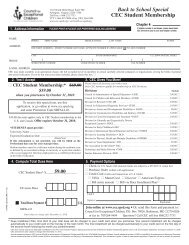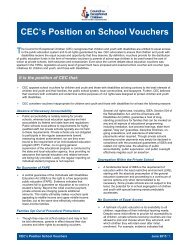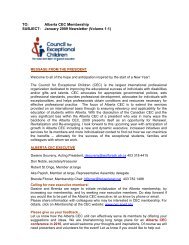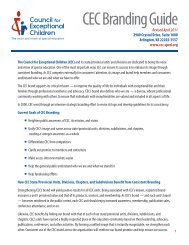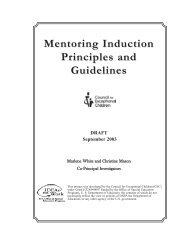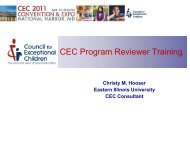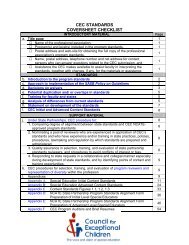What Every Must Know Special Educator - Council for Exceptional ...
What Every Must Know Special Educator - Council for Exceptional ...
What Every Must Know Special Educator - Council for Exceptional ...
Create successful ePaper yourself
Turn your PDF publications into a flip-book with our unique Google optimized e-Paper software.
children with disabilities in charter schools<br />
must be the same as those that apply to other<br />
public schools, and en<strong>for</strong>cement of these<br />
standards must be conducted in a manner<br />
that is consistent with en<strong>for</strong>cement activities<br />
and penalties that apply in determining<br />
compliance of other public schools.<br />
Paragraph 13 – Safe and<br />
Positive School Climate<br />
CEC recognizes the important impact a safe and positive<br />
school climate has on the personal development<br />
and academic achievement of all students. Research<br />
has shown that schools implementing supportive and<br />
positive school climate strategies are more successful<br />
in creating environments conducive to learning.<br />
Recent incidents of school violence, including harassment<br />
directed at students with disabilities and/or gifts<br />
and talents, have drawn attention to the unacceptable<br />
cost of not assuring a safe and positive climate in our<br />
schools <strong>for</strong> all students. Furthermore, students with<br />
disabilities may be more at risk because they do not<br />
necessarily have the ability to understand and report<br />
what is happening to them.<br />
Such incidents, as well as surveys of students and<br />
faculty regarding safety, document continuing and<br />
pervasive harassment and bullying experienced by<br />
students and reveal that these actions are more likely<br />
to be perpetrated on the basis of appearance and actual<br />
or perceived differences in ethnicity, race, language,<br />
abilities, gender, sexual orientation, gender expression,<br />
or religion.<br />
As student enrollment becomes increasingly diverse,<br />
schools are challenged to assure that all students feel<br />
valued and supported. Available research confirms<br />
that students feel safer and learn better when schools<br />
have clear policies prohibiting harassment and<br />
discrimination and when all members of the school<br />
community (students, parents, educators, administrators,<br />
and other school personnel) actively uphold the<br />
right of every student to a safe learning environment.<br />
Harassment can take many <strong>for</strong>ms, including cyber<br />
bullying and other technological/electronic methods.<br />
In addition, although overt acts easily come to the<br />
attention of schools, it is essential that covert acts<br />
are recognized and addressed. CEC believes that all<br />
members of the school community have a critical role<br />
to play in assuring that students have access to a safe<br />
and supportive school environment.<br />
In light of legal mandates and professional standards<br />
that promote the use of evidence-based practices<br />
to increase positive academic and social-emotional<br />
252 whAt every SpeCiAl eduCAtor muSt <strong>Know</strong><br />
behaviors among students, CEC believes that special<br />
educators must acquire and use a knowledge base of<br />
effective practices <strong>for</strong> promoting supportive school<br />
climates in ways that support human and civil rights<br />
and promote social justice <strong>for</strong> the diverse student<br />
populations in today’s schools.<br />
Discrimination or harassment directed at students or<br />
adults on the basis of ethnic and racial backgrounds,<br />
language, age, abilities, family status, gender, sexual<br />
orientation, socioeconomic status, religious and spiritual<br />
values, and geographic location violates the human<br />
and/or civil rights of individuals who are the<br />
targets of such behavior.<br />
To ensure the creation of sage learning environments<br />
that contribute to all students’ cognitive, academic,<br />
social-emotional, and ethical development, it is the<br />
policy of the <strong>Council</strong> <strong>for</strong> <strong>Exceptional</strong> Children that:<br />
All schools should have clear policies that prohibit<br />
harassment and discriminatory behaviors of any<br />
kind, including those related to ethnic background,<br />
language, age, abilities, family status, gender,<br />
sexual orientation, socioeconomic status, religious<br />
and spiritual values, and geographic location.<br />
Students and staff should be clearly in<strong>for</strong>med<br />
of such policies and procedures, including data<br />
collection, reporting, sanctions, and indemnity<br />
to those reporting incidents. Educational ef<strong>for</strong>ts<br />
at the federal, provincial, state, and local levels<br />
should promote policies, guidelines, and universal<br />
interventions designed to reduce or prevent<br />
discrimination or harassment as well as to create<br />
a school climate that is conducive to respect and<br />
dignity <strong>for</strong> all individuals.<br />
Because bullying and harassment create<br />
emotional wounds that amplify the hardships of<br />
exceptionality as well as jeopardize the emotional<br />
and mental well-being of students, teachers,<br />
administrators, and other school support personnel<br />
with knowledge of harassment or bullying carry<br />
the responsibility to report these behaviors to<br />
relevant authorities and school personnel similar<br />
to the professional obligation to report child<br />
abuse.<br />
In recognition that students’ families, professionals,<br />
and staff may also be at risk of experiencing<br />
discrimination on the basis of factors including<br />
ethnic and racial backgrounds, language, age,<br />
abilities, family status, gender, sexual orientation,<br />
socioeconomic status, religious and spiritual<br />
values, and geographic location, school policies,



